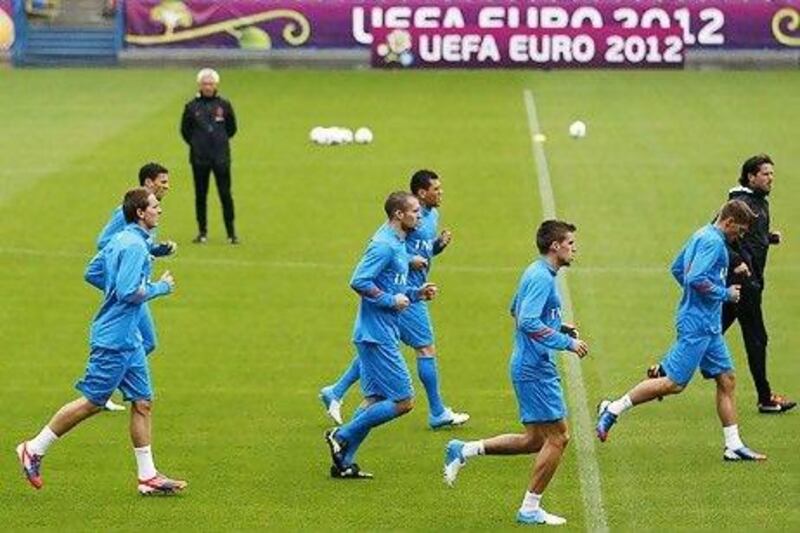Two years ago, the criticism was that Holland were not Dutch enough. The architects of total football were christened "the clogs of war" for their roughhouse tactics in the World Cup final. Johan Cruyff practically disowned them, talking of anti-football.
Two years on, Holland have been true to their traditions again. Just not the most admirable ones.
The Dutch and dissent have a long and inglorious history. Too many talented teams have been hampered by infighting.
Now the class of 2012 seem to be establishing their credentials as a quintessentially Dutch side at the Euro 2012.
Wesley Sneijder talked of "pathetic egos" before the defeat to Germany and said "our understanding appears to have disappeared" after it.
Arjen Robben indicated his displeasure at being substituted by vaulting angrily over the advertising hoardings and mooching moodily around the perimeter of the pitch before reaching, but not sitting in, the dugout.
Bert van Marwijk, the manager, publicly criticised his wingers, Robben and Ibrahim Afellay, for lacking pace and not troubling the Germans.
The signs are that the Dutch are unravelling. Even beating Portugal tonight might not take the World Cup finalists into the quarter-finals.
They are likely to be the Group of Death's biggest casualties. If so, self-inflicted wounds will feature prominently in the autopsy report.
Their fortunes have swung swiftly and dramatically. Holland only lost two of their first 41 games under Van Marwijk, including the World Cup final. They have been defeated in five of their last nine games, suffering back-to-back losses for the first time since the 60 year old took over in 2008.
If Denmark's extraordinary 1-0 win, when 28 Dutch attempts did not yield a single goal, was more avoidable, the ferocity of their rivalry with Germany makes any defeat to their neighbours more painful.
With it, Dutch divisions have become more apparent. The surprise for some is that unity was preserved for so long.
In Marco van Basten's reign, Mark van Bommel refused to play while Sneijder feuded with Robin van Persie. The Arsenal captain had a troubled relationship with Van Marwijk in their time together at Feyenoord. Robben's individualism is so pronounced that even Franck Ribery seems more of a team player at Bayern Munich.
And yet, for the best part of four years, things proceeded swimmingly. Until now. Van Marwijk's skills as a diplomat, as a massager of egos, appear to have deserted him. Making his son-in law Van Bommel captain left him open to allegations of nepotism, especially when the 35-year-old midfielder performs as poorly as he did against Germany.
Having a side that seemed set in stone antagonised Klaas-Jan Huntelaar, whose 48-goal season for Schalke counted for little, and Rafael van der Vaart, a winner of 98 caps but also on the bench.
Also frozen out of the midfield and attack was Dirk Kuyt. So assiduous in tracking back, he might have helped the struggling 18-year-old left-back Jetro Willems. His successor on the left flank, Afellay, certainly has not.
Now Van Marwijk faces a battle to save his job, which will be reviewed after the tournament.
He has to amend his blueprint, to abandon his obduracy and conjure victory from the ruins of a wrecked campaign.
Perhaps Huntelaar could lead the line with Van Persie operating in his slipstream. Maybe Kevin Strootman or Van der Vaart, rather than Van Bommel, should partner Nigel de Jong in midfield.
Several - Kuyt, Van der Vaart, Sneijder - look superior alternatives to Afellay. Wherever he starts, Holland have to get the ball to Sneijder, the one of the supposed superstars who has performed.
Because a historic low beckons. Not since 1984, when they did not qualify for the European Championships, have the Dutch failed to progress from the group stages.
It is a remarkable display of consistency, considering the ever-present possibility of civil war.
The Dutch trait of independent thought is a constant, encompassing players from various generations, but, even if only for 90 minutes, 11 different, dissenting individuals need a meeting of minds to form a team today.
Follow us
[ @SprtNationalUAE ]





